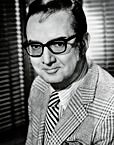 Writer Steve Allen’s quote is obviously referring to the fact that radio requires the listener to imagine what is happening, whereas TV will simply show you. This is well and good for radio dramas and the like, where some listeners may prefer their own active mental images to the passively accepted ones of television, but what of news? In an industry that prides itself on providing the most accurate and up to date information, are listeners’ mental images enough? Where is radio news’ place now that we have television with its multitude of images, and online news with its extreme accessibility?
Writer Steve Allen’s quote is obviously referring to the fact that radio requires the listener to imagine what is happening, whereas TV will simply show you. This is well and good for radio dramas and the like, where some listeners may prefer their own active mental images to the passively accepted ones of television, but what of news? In an industry that prides itself on providing the most accurate and up to date information, are listeners’ mental images enough? Where is radio news’ place now that we have television with its multitude of images, and online news with its extreme accessibility?
Television news is often seen as superior to radio news for the simple reason that they can show you the news rather than simply telling you. Being such a visual society, it’s difficult for people to believe in something they can’t see. Of course the downside to television is the fact that sometimes the pictures overwhelm the story. If an anchor has something in his teeth, or her hair is sticking up, that is all the viewers will focus on. Ask them afterwards and they will have no idea what the top stories were as they were too distracted.
I was part of a group recently that interviewed Jill Dempsey from Metro Morning on CBC Radio One. Jill, who has worked in both TV and radio, brought up the point that I raised above: television puts the majority of the focus on what is seen rather than what is happening. She told us that there is such a focus on looks in television, which makes it hard to age on TV, especially for a woman. Even more relevant was her comment that in radio, the focus is simply on the story or the interview. Were the questions relevant? Did all the information get covered? Could listeners understand the story and why it was news? While these questions are asked in television news, they are definitely overshadowed by the question: did it look good?
The images of TV news overwhelming the story is not an issue for most news watchers. Despite these facts, many people would still prefer to watch their news rather than listen to it. Radio could still survive however, as it was the more portable and accessible medium. Most television newscasts happened three or four times a day, but in between, radio news could tide listeners over until the next newscast. Obviously the exception to this is the 24 hour news network, which I will be discussing in more detail later this semester. Radio was also easy to transport wherever it was needed. With small, battery operated radios and radios installed in cars, listeners could take their news anywhere.
But, when online news appeared, radio’s title as the most accessible and portable medium was threatened. With smaller and smaller devices, such as iPods and Blackberry’s now able to access the internet, one could literally carry the news around in their pocket, with minute by minute updates as well. In offices, rather than the entire room listening to the same radio station and getting the same news, each employee can look up their own news online; consuming only what is interesting and relevant to them.
The only place radio still has a stronghold is with its use in cars. While traditional radio stations are suffering because technology such as iPods allow consumers to be their own DJ, all talk and all news radio are as strong as ever. Stations like 680 News here in Toronto are invaluable to commuters and anyone driving to work in the morning. While in traffic, it is dangerous for the driver to look at news on their Blackberry or similar device, so instead they rely on radio news to fill them in. As well, most all news radio stations have a strong traffic department which is important to commuters.
So what does all this mean for the future of news on the radio? As internet radio permeates the public consciousness, traditional radio news will become less and less popular. One way traditional radio is competing is by making their stations available online. Interestingly, this also means that one major disadvantage of radio has been erased. Radio waves can only travel so far, so each time you leave a city, you must tune into another radio signal. With these stations being available over the internet, someone on the other side of the globe could listen just as easily as someone down the street from the station. This is a strong strategy on the part of radio broadcasters, and it seems to be working so far.
Radio is by no means disappearing. It is often the first place people turn for breaking news, such as natural disasters, although online news is muscling in on this as well. As long as commuters and drivers want to hear news in their cars, radio will survive. But, radio’s willingness to adapt to new technologies makes it even more likely that we will have radio news around for many years to come.
Source: http://jessicasnews.blogspot.in/2009/02/radio-is-theatre-of-mind-tv-is-theatre.html